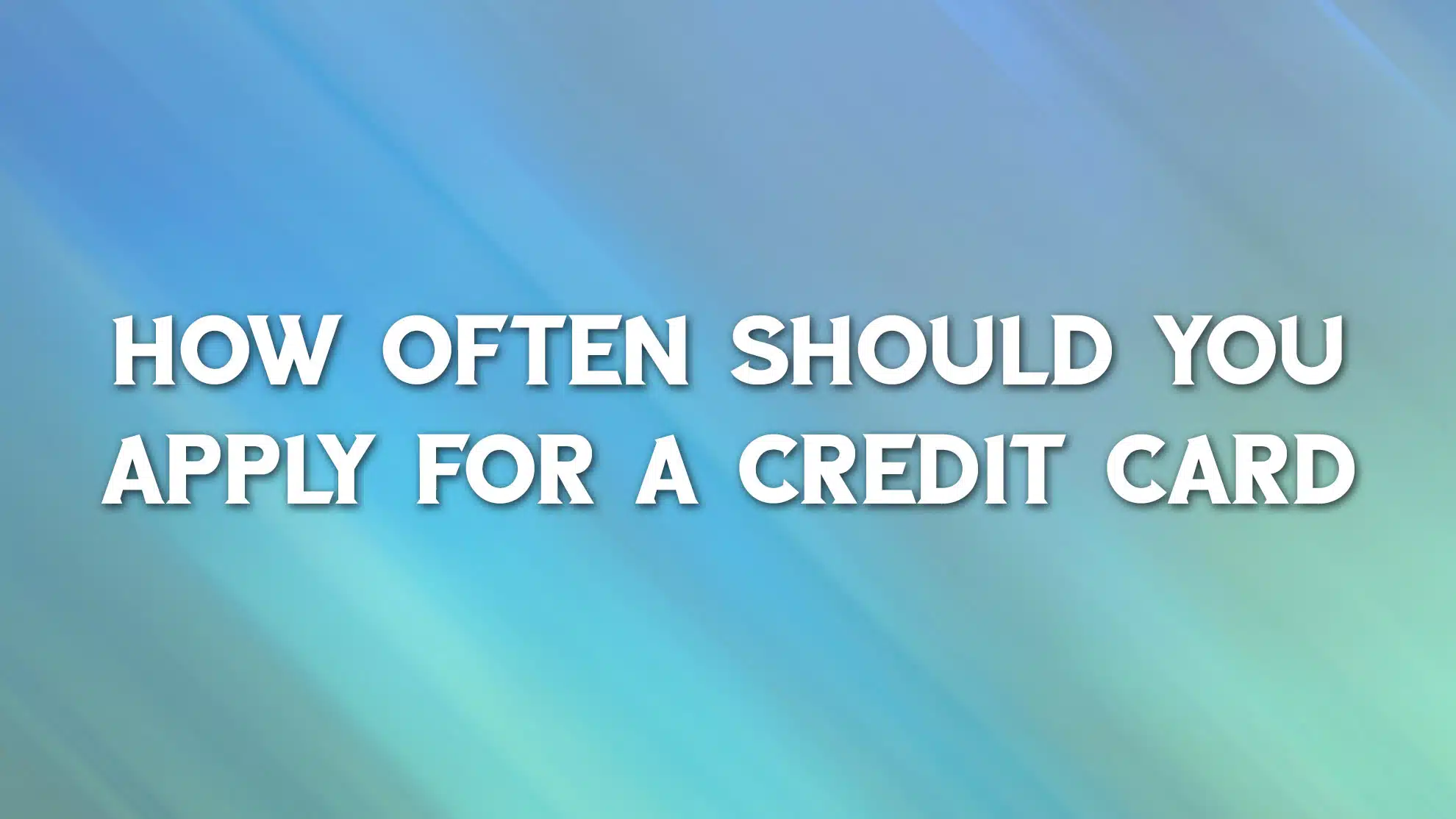
Learn How Often Should I Apply for a Credit Card and When You Can Open New cards in 2022 or should you wait between applications to not hurt my credit
[sc name=”googleinpostad”]
Video transcription
Video Credit: Mark Reese’s Youtube Channel
How Often Should I Apply for a Credit Card?
If you’re considering adding a new credit card to your wallet, you should think about whether to do so right now or wait a little longer. After all, applying for a card can affect your credit score, and there may be other factors to consider, such as if you’re applying for a mortgage or a credit card sign-up bonus.
Know the Credit Score Ranges Before Applying for a Credit Card
Companies consider various variables when you apply for a credit card, including:
- Your credit ratings
- Income
- The monthly payment for rent or mortgage
Your credit score is the most critical factor in credit card approval choices.
What Exactly Is a Credit Score?
A credit score ranges from 300 to 850, which assesses a person’s creditworthiness. The higher borrowers’ scores, the more appealing they appear to potential lenders.
Credit history, which comprises the number of open accounts, total debt levels, repayment history, and other variables, determines a credit score. Lenders use credit ratings to determine whether a borrower will repay loans on time.
How your credit score is determined
Your credit score is determined by the five elements listed below:
- Your payment history defines 35% of your score. This demonstrates whether you pay your bills on time, how frequently you miss payments, how many days past the due date you pay your bills, and how recently payments have been missed. Prices made more than 30 days late are commonly reported to your lender, lowering your credit score. Factors include how far behind you are on a bill payment, the number of accounts with late fees, and if you’ve made the accounts current. Your credit score suffers every time you miss a payment.
- The amount you owe on loans and credit cards accounts for 30% of your score. This is determined by the total amount you owe, the number and type of accounts you have, and the amount due about the amount of credit you have available. High balances and credit card maxes will lower your credit score, but smaller proportions may boost it if paid on time. New loans with minimal payment history may temporarily reduce your credit score, but loans nearing completion may raise it due to successful payment history.
- The length of your credit history determines 15% of your credit score. The longer you have a track record of paying on-time payments, the higher your credit score will be. This is why you should maintain your accounts open and active. Avoiding applying for credit and carrying debt may appear prudent, but it may harm your credit score if lenders have no credit history to evaluate.
- The sorts of accounts you have accounted for 10% of your total score. Having a variety of reports, such as installment loans, house loans, retail, and credit cards, may help you enhance your credit score.
- The remaining 10% is made up of recent credit activity. If you’ve recently opened many accounts or applied to open accounts, it may indicate possible financial difficulty and reduce your score. Credit scoring models are also designed to identify that recent loan activity does not necessarily mean a consumer is dangerous.
INCOME Requirements to Apply for a Credit Card
The greater your income, the greater your credit lines may be (and vice versa). Banks consider your income as part of their risk assessment criteria. Increased wages make banks more confident that you’ll be able to pay off your debt, so they’ll typically give you additional purchasing power in the shape of higher credit limits.
What Effects Credit Card Applications Have on Your Credit Score
Applying for a new credit card can have a variety of effects on your credit score. What happens to your credit record and score is as follows:
- Utilization of credit:
Your total credit limit increases when you open a new credit card. Assuming everything else remains constant, your credit usage ratio will decrease, and your credit score will rise. Credit usage is represented as a percentage and compares the amount of debt you have to the quantity of credit you have. For example, if you have a $10,000 credit limit and owe $5,000, your credit utilization is 50%. Opening a new credit card with a $10,000 limit gives you $20,000 in total credit, lowering your utilization to 25%. Credit use should be kept below 30%, according to experts.
- New credit check:
The issuer will conduct a rigorous credit check as part of the application process for a credit card. Every hard inquiry lowers your credit score by up to five points. Complex questions can linger on your credit report for up to two years, but they only have a 12-month influence on your score. Too many credit card applications in a short period might have a negative impact on your credit score.
- Accounts have an average age:
The average age of your funds will be reduced if you open a new one. The impact is determined by the number of other accounts you have open and their age. The negative effect on persons with established credit is limited.
- Credit allocation:
Lenders prefer borrowers to have a variety of credit to demonstrate their ability to handle various payments. Your present credit mix determines the effect of opening a new card on this scoring element.
Opening a new card does not affect your payment history. However, your payment history may suffer if you fail to manage this new account responsibly and make all of your payments on time. Sign up for automatic payment of the minimum amount needed to avoid missing payments.
- Credit Card Issuer Restrictions:
You probably don’t want to face the credit hit for a card you won’t get. As a result, even with excellent credit, some issuers impose certain limits on applying for and receiving cards. Among these causes are:
- Combating card churning occurs when applicants seek cards, get points or cash, and then cancel the card to collect points or money again.
- You are limiting your total credit limit or the number of credit cards issued to lessen the bank’s risk if you suddenly cannot pay your payments.
- The broader economy might also influence temporary limits. Banks tightened card underwriting rules for several years during the past recession, including adjusting credit score cutoffs and reducing credit lines.
Online message boards and websites discuss various issuer “rules” regarding card application. These rules are frequently gathered through crowdsourcing experiences, and many of these rules, policies, or guidelines may not be verifiable on credit issuer websites. These regulations or policies may also evolve, and exceptions may be created. Here are a few instances; however, this is not exhaustive.
Credit Card Application Restrictions
These restrictions require you to limit card applications to a specified time window, and they can apply to all applicants or simply those within the bank or issuer. Rumors suggest the following limitations:
- With a few exceptions, the Chase 5/24 rule states that if you’ve opened more than five cards in the last 24 months, you’re unlikely to be approved for most Chase cards.
- Citi has an 8/65 limit, which means you must wait eight days between card applications and cannot apply for more than two cards in 60 to 65 days.
- The American Express 2/90 rule states that you can only be approved for two American Express cards in a 90-day period.
However, the issuers did not confirm or deny these rules at the time of publication.
Some issuers have their own set of application guidelines. Wells Fargo, for example, advises that if you’ve received a Wells Fargo card in the last six months, you may not be eligible for another. According to reports, you may only be authorized for a Discover card every 12 months or a Capital One card every six months.
Limitations on the New Credit Card Cardholder Bonus
If you want to get a cash or point bonus as a new card member, or a low introductory interest rate, you need special pay attention to issuer limits on how frequently you can apply for a credit card.
Citi, for example, does not award a cash or point bonus if you have previously received a new card member incentive for certain cards during the previous 24-48 months or if you end an account with certain cards within that time frame. For example, with the Citi Premier Card, applicants can receive the welcome bonus only if they haven’t received a new cardmember bonus for Citi Rewards+, Citi ThankYou Preferred, Citi ThankYou Premier/Citi Premier, or Citi Prestige in the previous 24 months (or if the applicant hasn’t closed any of these accounts).
You might be ineligible for another introductory offer or incentive if you obtained an initial rate or bonus for any Wells Fargo consumer credit card during the last 15 months.
Conclusion
If you don’t have a long credit history or your credit score is recovering after a previous mistake, getting approved for a credit card can take some time. When building credit, keep in mind that it may take some time for your efforts to be reflected in your credit score. Meanwhile, maintain excellent credit practices (such as paying bills on time) and consider enrolling in a free credit monitoring program to check your improvement monthly.
I am not a financial advisor and This is NOT financial advice.
Please use any financial service at your own risk.
If you click on a partner link on this page, I may receive an affiliate commission compensation if you sign up for a service or product.

